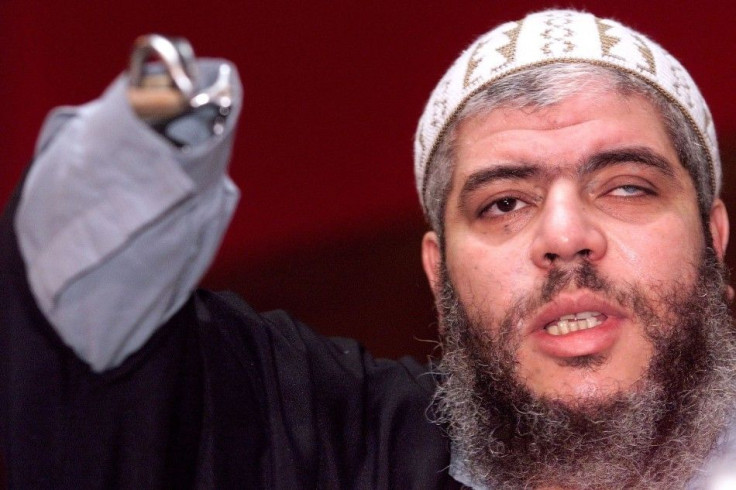Abu Hamza And The Queen: A Radical Cleric's Run-In With Royalty

In a rare kerfuffle, Her Majesty Queen Elizabeth II is now involved in the case of an extremist Muslim cleric who will be extradited to the United States on charges of terrorist activities.
BBC correspondent Frank Gardner spilled the royal beans on Tuesday morning when he told BBC Radio 4 that the queen herself had pushed for the investigation and arrest of Abu Hamza al-Masri several years ago.
In Great Britain, this represents a glaring breach of protocol -- the queen typically steers clear of divisive political issues. The BBC has issued an apology for Gardner’s gaffe, but some are wondering whether the monarchy itself arranged the oddly timed disclosure.
The story of Hamza is a strange one. He was born in Egypt but moved to the United Kindgom during his early 20s. During those early years, his lifestyle did not fit the profile of a Muslim extremist; he worked as a receptionist at a hostel in London and then moved on to become the bouncer at a local nightclub.
Hamza married a woman from a Catholic family and had children, according to the BBC. But shortly thereafter, he began to take a greater interest in Islam. After a few years of marriage, he deserted his new wife and eventually ended up in Afghanistan, where he participated in reconstruction efforts at Jalalabad and reportedly lost both hands and one eye to a mining explosion.
He moved back to England for medical treatment, where his right hand was replaced with a metal hook.
Hamza moved to the former Yugoslavia during the mid-1990s, where he took up arms to support the Bosnian Muslims. Then he went back to London, where he became a radical imam at the Finsbury Park Mosque.
The cleric then became notorious for preaching extremism. In sermons, Hamza praised acts of terrorism and lauded such tragedies as the September 2001 attack on the World Trade Center in New York City and the explosion of the Columbia Space Shuttle in 2003.
It was during this time period -- when Hamza was on the radar of British security forces but not yet charged with any wrongdoing -- that the queen allegedly spoke out against him.
In Great Britain, it is a matter of convention that the monarchy generally does not play a strong role in matters of day-to-day governance. Any comments the queen makes during private meetings are assumed to be off the record.
So Gardner’s decision recount his years-old conversation with Her Majesty during an on-air conversation this morning may have ruffled royal feathers.
“The queen was pretty upset that there was no way to arrest [Hamza]. She couldn't understand; surely there had been some law that he had broken?” Gardner said.
Following a surprised interjection from the radio host, he went on.
"She spoke to the home secretary at the time and said, ‘Surely this man must have broken some laws. Why is he still at large?’ He was conducting these radical activities, and he called Britain a toilet. He was incredibly anti-British, and yet he was sucking up money from this country for a long time. He was a huge embarrassment to Muslims, who condemned him."
Hamza was finally investigated for wrongdoing and arrested in 2004. Two years later, he was convicted of 11 charges related to hate speech and inciting violence.
He will now be extradited to the United States, along with four other suspected terrorists. Hamza appealed this move at the European Court of Human Rights, arguing that he would be subject to inhumane treatment. His appeal was rejected on Monday.
U.S. authorities charge that the cleric supported the Taliban, assisted kidnappers in Yemen who killed four hostages in 1998 and organized a terrorist training camp on American soil. If convicted, Hamza could face life in jail.
It was this pending extradition that put Hamza in headlines again, prompting the BBC radio interview with Gardner on Tuesday that resulted in a violation of royalty confidentiality protocol.
BBC has since apologized to the monarch in a statement.
“This morning on the 'Today' program, our correspondent Frank Gardner revealed details of a private conversation, which took place some years ago with the queen,” it said.
"The conversation should have remained private, and the BBC and Frank deeply regret this breach of confidence. It was wholly inappropriate. Frank is extremely sorry for the embarrassment caused and has apologized to the palace."
But Republic, a British campaigning group that opposes the monarchy, suspected foul play. In a statement today, spokesperson Graham Smith said the queen purposely interfered in a divisive issue in order to plant herself on the side of the public.
“Exploiting this issue for P.R. purposes is not fitting behavior for a head of state. The BBC also have to answer for the way they have handled this revelation,” said Smith.
“The decision to disclose this one conversation while keeping all else secret smacks of a deliberate P.R. stunt to put the queen on the right side of public opinion. Yet the BBC have acted as the official mouthpiece of the palace without making any attempt to scrutinize what has been said.”
Buckingham Palace has not released any statements in response to these allegations or to BBC’s apology.
© Copyright IBTimes 2024. All rights reserved.












